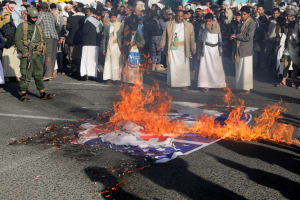Washington bolsters military presence in the Middle East to deter Iran from launching attack on Israel

The United States has deployed F-22 Raptor fighter jets and a smaller-scale aircraft carrier to the Middle East in response to threats from Iran and Hezbollah following the targeted killings of top Hezbollah and Hamas figures in Beirut and Tehran.
The F-22 is a fifth-generation fighter jet and widely considered one of the most advanced war planes in the world. A squadron of around 12 F-22 fighter jets was dispatched to the Middle East from a military base in Alaska.
The purpose of Washington’s military buildup is reportedly to deter the Iranian regime and its terrorist proxies to escalate attacks against Israel.
"They can be a very invaluable defensive platform," U.S. Deputy Pentagon Press Secretary Sabrina Singh said, referring to the F-22s.
"They add maneuverability [and] additional systems that allow the commander to have more versatile options. And I think it sends a very clear signal to the region that we want to see tensions de-escalate. And it sends a really powerful message of deterrence,” she added.
In addition, Washington dispatched the assault ship USS Wasp, nicknamed “mini-aircraft carrier,” to Cyprus in the Eastern Mediterranean. The vessel is reportedly equipped with combat helicopters and a Marine Force unit of an undisclosed size.
U.S. Defense Secretary Lloyd Austin stressed that the deployment of additional U.S. military assets would enhance Washington’s already strong military presence in the Middle East.
"The changes in our force posture will enhance our already extensive capabilities in the region," Austin stated following a top-level conversation with Israeli Defense Minister Yoav Gallant.
"We are prepared to act on short notice to address emerging threats to our security, our partners, and our interests.”
Reports indicate that the Biden administration has intensified diplomatic efforts to persuade the Iranian regime to reconsider its attack on Israel, stressing that an escalation would not be in the interests of either Iran or Israel.
In April, Israel and an American-led global alliance neutralized 99% of the more than 300 drones and missiles Iran fired on Israel.
An Iranian lawmaker recently warned that the new attack on Israel would likely be more severe in scope.
"In the previous phase, about 300 drones and missiles were fired at the occupied territories, and this time, the number of projectiles may increase to, for example, about 600 war projectiles," Ahmad Bakhshayesh Ardestani said. He claimed that this time Tehran would launch a “surprise” attack without announcing it in advance.
Iran’s newly-elected President Masoud Pezeshkian has reportedly urged the nation's Supreme Leader Ayatollah Ali Khamenei that the Islamic Revolutionary Guard Corps should refrain from launching a direct attack on Israel out of concern it might trigger a full-scale regional war with significant consequences for the Iranian regime.
It is currently unclear whether Iran its proxy in Lebanon, the Hezbollah terror organization, will choose to launch a coordinated attack against Israel. Gallant recently noted that Hezbollah could launch an attack from Lebanon before Iran.
The Israeli defense minister warned that Hezbollah risked causing devastating destruction in Lebanon if it launched a large-scale attack.
“As things stand, Nasrallah may drag Lebanon into paying extremely heavy prices. They can’t even imagine what might happen,” Gallant said.
We recommend to read:

The All Israel News Staff is a team of journalists in Israel.














